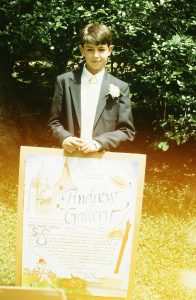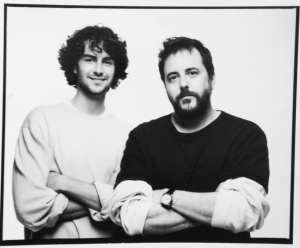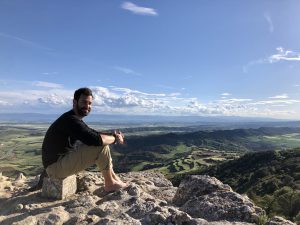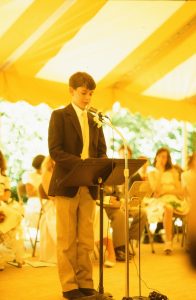Andrew Gallery ’80 : A True Experiential Education
Not that he talks about Miquon every day, or even thinks of his elementary education regularly, but when he does, he remembers it fondly — as his favorite school.
“I don’t have any, but when I do, I would send my kids there in a second,” he says with a chuckle. “I credit it with teaching me to love to learn, rather than focusing just on what I was learning. It literally taught me to love the act of learning and be concerned about the art of what I’m doing.”
In addition to the actual learning, Andrew loves that the school was an extension of the natural world it is immersed in. Even walking from building to building, he remembers crossing the creek and running between the trees. The positive vibes and harmony with its surroundings was something so unique and special, that even as a young boy, he absorbed that positive environment.
Andrew has been a vegetarian since age 10, thanks to Miquon’s chicken project. “We raised the chickens and cared for them, and we gave their eggs to the cafeteria. I told my teachers, and then I went home and told my parents, that I wasn’t going to eat chickens anymore,” he says. “I saw firsthand what we were eating, and I decided I cared too much for the animals.”
Andrew calls every teacher his favorite for the big roles they played in his life. “Tony, Lynn,
Arabella, Tammy, Bill, Cynthia … the list goes on and on.”
From Cynthia, his “sweet and amazing” Kindergarten teacher for whom he drew pictures to cheer her when she was sick, to Bill, the athletics teacher who taught lacrosse and cricket and attended Andrew’s high school lacrosse games, to Tony, whose science projects are etched in his mind.
“Bill introduced us to so many new and fun games,” Andrew says. “I always loved and appreciated that and know that he laid the foundation for me to be adaptable. That led to all the sports I played later.” Andrew loved lacrosse and tennis in high school, was on the crew team in college and currently participates in triathlons.
The science project he remembers most clearly is the catapult-building contest in which he discovered that sometimes victory comes to the smallest contestant. While his catapult—made out of pieces of wood, metal rods, rubber bands, marbles and a cup on top—was large and looked intimidating, it didn’t go very far at all.
Everyone gathered in the field to watch the catapult demonstrations — “And I was standing there right next to the smallest catapult. And the tiniest one of all destroyed every other one. It just had all the physics right. It was brilliant.”
Andrew recalls Tony’s approach. “He explained what catapults were and how they were used. Our imaginations went into overdrive seeing them wheeled about.” And then Tony told them that they would get to make their own.
“You get excited and it’s real,” says Andrew. “It’s not something you read about. There are no blueprints except in your imagination. I remember having a lot of freedom and knowing that things don’t always turn out right the first time.” The youngsters sourced the wood and learned as they went. Safety was always paramount, and another beauty of the project was that it happened in a few days.
“To have an idea and complete it in a short period of time kept our interest,” Andrew says. “Both my parents were architects, so I thought I might have a leg up on that project, but that wasn’t the case,” he says laughing.
Experiential Education
Everything was an experience, and that experiential education made a huge impact on Andrew and his worldview, and on the way he chose to approach his life after Miquon, beginning with sixth-grade graduation, when he chose a quote by John Locke to include in his speech:
“Locke said, ‘No man’s knowledge here can go beyond his experience,’ and I still remember and live by that.”
“At Miquon, you get to do it all, not just read about doing it,” Andrew says, remarking on planting a garden at the school to learn about vegetables and how they grow. “We even had to walk to a nearby farm, bag our own manure and carry it back to fertilize our plot,” he says. The raised beds were situated near the library, near the 5/6 classroom, where he remembers planting snow peas, lettuce and mustard.
And he loved the “art stuff.”
 “We were told we were going to paint a mural outside the art room, and we painted self-portraits. I painted a picture of myself wearing a wetsuit and a surfboard, and as an adult I moved to Los Angeles [where he surfs],” he says. “That mural is still there. I can’t believe they allowed us kids to paint something on the side of the building.”
“We were told we were going to paint a mural outside the art room, and we painted self-portraits. I painted a picture of myself wearing a wetsuit and a surfboard, and as an adult I moved to Los Angeles [where he surfs],” he says. “That mural is still there. I can’t believe they allowed us kids to paint something on the side of the building.”
The encouragement he and his fellow students received to try self-expressive projects “separated the end result from the doing of it,” he says. “I wasn’t always so focused with the finished project,” he explains. “I learned that it’s okay to explore and do new stuff and it’s so valuable for people to not get caught up wondering about the final result. It is okay to move on and try a lot of things firsthand. It’s always better to do it.”
The Magic of Miquon
Of course, at 10, Andrew didn’t realize that he was learning while he was having fun. “Like the Karate Kid, who learned while painting a fence and washing cars, I learned that I can do it. Whatever that it is—painting, drawing, building catapults—I learned confidence in myself. I’ve always been amazed at what I have seen Miquoners go on to do. Incredible things!”
By caring for the chickens, he learned where food comes from and to respect the source. “We didn’t just eat carrots, we grew them. We learned to have a deep connection and understanding of the value of things,” he says. “When you do these things for yourself, you understand at a deeper level and you’re brought closer to it—farming, social studies, math, anything.”
Everything to Andrew was dynamic, engaging and fun, and he carried his social skills with him to Penn Charter, which he attended through high school graduation. He was active in sports—tennis, lacrosse, soccer, squash, baseball—and loved art history, photography and making movies using a 16mm camera. There is even a character in the ABC TV show, “The Goldbergs,” based on Andrew from his time at Penn Charter.
“Re-calibrating and adjusting” to the school, to larger class sizes, tougher workloads and tests took some time, but he was well-prepared when he entered Ithaca College’s film and photography program, majoring in Cinema and Photography, with a minor in Spanish and Art History. While there, he did a lot of production, winning multiple awards and even selling a movie about underage drinking to Harvard.
 A year-long study-abroad program in Spain turned into “I thought I would never come back,” when he fell in love with the country. When he returned to the United States, it was to Ithaca’s Los Angeles program. After graduation, Andrew worked on The Tonight Show where he met Mark Romanek, a director and fellow Ithaca alum. Andrew shared his demo reel with Mark and said he wanted to work with him. To his surprise and delight, Mark said yes, and became his unofficial mentor. Andrew did a little bit of everything working with Mark, working on everything from feature films to photo shoots, learning as he went.
A year-long study-abroad program in Spain turned into “I thought I would never come back,” when he fell in love with the country. When he returned to the United States, it was to Ithaca’s Los Angeles program. After graduation, Andrew worked on The Tonight Show where he met Mark Romanek, a director and fellow Ithaca alum. Andrew shared his demo reel with Mark and said he wanted to work with him. To his surprise and delight, Mark said yes, and became his unofficial mentor. Andrew did a little bit of everything working with Mark, working on everything from feature films to photo shoots, learning as he went.
Andrew’s career and experiences are tied together with threads of creativity, writing, film, photography and charity work, along with having a sense of adventure. “And if the quote by Locke is true, I should definitely have a lot of knowledge by now.”
He worked as a director and writer, on projects ranging from nationwide PSAs against drinking and driving, writing movies with Kanye West, and being Britney Spears’ in-house director and photographer during her comeback. “That was an incredible opportunity, and it was amazing to get to work with her almost every day.”
In 2010, he started an inspirational activewear line, IAMMAI, with the concept of printing messages on shirts, backwards, so the wearer can read them in the mirror. The line sold at Equinox and around the United States, as well as in more than 30 countries.
Inspired by his close friend and publicist, Kelly Cutrone, Andrew also organized a trip to India to donate water filters to communities in need. He also worked with a tech startup called Omaze in business development, helping create once-in-a-lifetime experiences that get raffled off to supporters. In just over five years, the company has raised more than $100 million for charities around the world. Today, Andrew is living in Los Angeles, back at work developing ideas for television and the movies.
“All this goes back to Miquon,” Andrew stresses. “I’ve tried a lot of different things, succeeded and failed. The fact that I don’t know exactly what I’m doing sometimes, helps me. Miquon laid a foundation to be courageous and to be unafraid to go after something I believe in. I truly believe anything is possible. All you have to do is go for it. Oh, and work really hard.”

